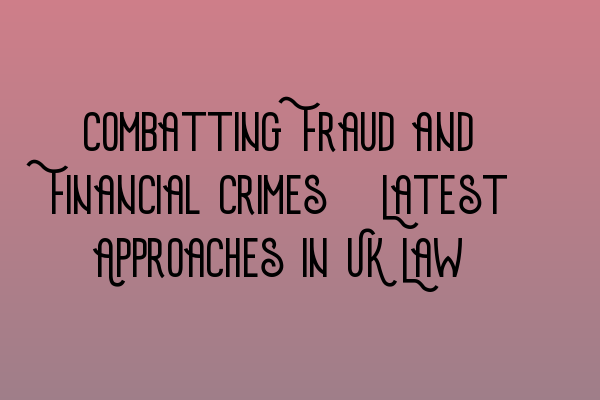Combatting Fraud and Financial Crimes: Latest Approaches in UK Law
Fraud and financial crimes have become increasingly prevalent in today’s digital age. With the advancement of technology, criminals now have new avenues to exploit and execute their fraudulent activities. To combat this growing menace, UK law has adopted various approaches and strategies to keep up with the evolving nature of fraud and financial crimes. In this article, we will explore the latest approaches used in UK law to combat fraud and financial crimes.
1. Legislative Measures
The UK government has introduced several legislative measures aimed at tackling fraud and financial crimes effectively. The Fraud Act 2006, for instance, provides a comprehensive framework to prosecute individuals involved in fraudulent activities.
Additionally, the Criminal Finances Act 2017 has strengthened the legal framework by imposing strict liability on corporations failing to prevent tax evasion. This act also introduced the concept of Unexplained Wealth Orders (UWOs), which can be used to seize assets suspected to be derived from criminal activities.
SQE 1 Practice Mocks FLK1 FLK2
2. Enhanced Investigative Techniques
Law enforcement agencies in the UK have adopted advanced investigative techniques to uncover and gather evidence related to fraud and financial crimes. These techniques include digital forensics, data analytics, and collaboration with international agencies.
By leveraging technology and data analysis, investigators can identify patterns and anomalies that may indicate fraudulent activities. This proactive approach enhances their ability to detect and prevent financial crimes, ultimately leading to more successful prosecutions.
3. International Cooperation and Information Sharing
Fraudsters often operate across national borders, making it crucial for law enforcement agencies to collaborate and share information with their international counterparts. The UK has strengthened its cooperation with global organizations, such as Interpol and Europol, to enhance their capacity to combat cross-border fraud.
Through increased information sharing, intelligence agencies can identify and track criminal networks involved in financial crimes. This collaborative approach facilitates the timely exchange of crucial data, helping investigators build stronger cases and bring offenders to justice.
4. Public Awareness and Education
Prevention is always better than cure. To tackle fraud and financial crimes effectively, it is essential to educate the public about potential risks and precautionary measures. The UK government and various organizations have launched awareness campaigns to inform individuals about common fraud schemes and how to safeguard their finances.
Increased public awareness can serve as a deterrent, making it more challenging for fraudsters to prey on unsuspecting victims. By empowering individuals with knowledge and understanding, they can take proactive steps to protect their financial interests and report suspicious activities promptly.
Conclusion
The fight against fraud and financial crimes is an ongoing battle. UK law continues to evolve and adapt to the changing landscape of criminal activities. Legislative measures, enhanced investigative techniques, international cooperation, and public awareness are some of the latest approaches employed to combat fraud effectively.
By staying up-to-date with the latest developments and equipping ourselves with the necessary knowledge, we can contribute to creating a safer financial environment for all.
